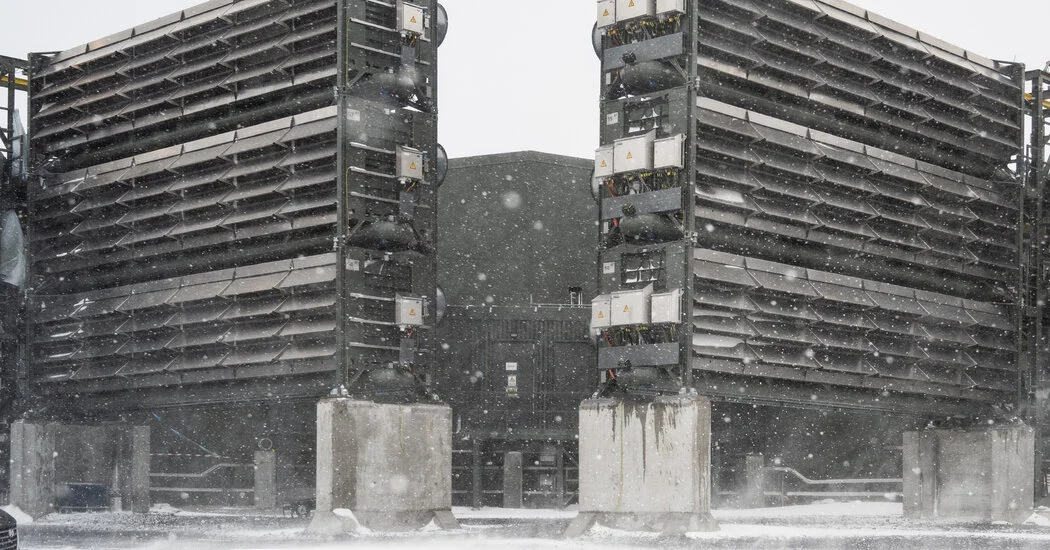No.
Better than nothing.
If we have to overbuild green energy to get a reliable supply, use the excess on things like this.
It’s also has a directly measurable output (…input?) - I would prefer that money was spent on this rather than carbon offsetting, which is basically a scam.
Considering all of the car still on the road gas furnaces and stoves still in houses that need to be replaced all of the other pesky smaller sources of carbon emissions going to zero is going to be a pain in the ass, the last 10 or 20% being the most annoying of all so you’re going to need something. Meanwhile we’re already throwing away solar and wind power in excess of what we can do anything with, and we could easily end up with cheap enough solar that for about 8 hours a day there’s literally unlimited free energy you could dump into something like this
We could stop cutting down the fucking rainforest and start planting trees since that’s already engineered by nature.
We could also stop digging up oil from the ground and burning it. Novel idea I know.
Fully grown trees are carbon neutral. Yeah trees are made of carbon and when growing they pull carbon from the air and turn it into wood. Once fully grown that’s it.
We should use more wood for construction, that way we clear more land for growing new trees with the wood essentially storing carbon in the structure of a building.
But the impact of that won’t be much. We should do it because every little bit counts, but it would only be a minor part of a much larger solution.
We could also stop digging up oil from the ground and burning it. Novel idea I know.
Yup. That’s the crux of the problem. We’re pulling chemicals from the ground and burning it. Were do the gases from that go? Nowhere. They just stay in the atmosphere.
Biochar – Use highly efficient biochar retort machines to turn clean biomass waste into carbon that will last thousands of years and use it as an amazing soil amendment.
The numbers presented are funny.
Global carbon dioxide emissions hit an all-time high of 36 billion metric tons last year.
Discussing Occidental’s plants:
Powered by solar energy, and have the potential to capture and sequester 500,000 metric tons (0.0000005 billion metric tons) of carbon dioxide per year.
Which then they say they plan on building more of said plants:
Occidental said it planned to build 100 facilities, each capable of capturing 1 million metric tons of carbon dioxide a year
The annual amount captured magically doubles bringing it up to 0.000001 billion metric tons per plant and 0.0001 billion metric tons total annually.
It really seems like we should listen to the Vicki Hollub, Occidental’s chief executive, when they state the real purpose of direct air capture which could:
“preserve our industry. This gives our industry a license to continue to operate for the 60, 70, 80 years that I think it’s going to be very much needed.”
This is ignoring their main usage of that 0.0001 billion metric tons is for oil extraction thus increasing the 36 billion metric tons.
In other words shame on the NYT for burying the lead and being deceptive with their numbers.
(@facedeer, I’d be curious to get your take on this article)
It’s NYT so they’d be using the American billion. So 1 billion = 1000 million.
So 100 plants * 1 million would be 0.1 billion metric tons. Still far short of the 36 billion metric tons per year.
This is ignoring their main usage of that 0.0001 billion metric tons is for oil extraction thus increasing the 36 billion metric tons.
I think it’s best to think of oil like the illegal drug industry. Better to focus on reducing demand, and the supply will drop. Electric cars, better transit, replacing power plants will reduce the amount of oil being burned, and if you do that the oil industry can’t sell something no one is buying.
But all that being said I’m mostly in agreement with you. This technology alone isn’t going to solve global warming. We have to stop using fossil fuels and do it fast.
But some things aren’t very simple. The airline industry puts about a billion tons of carbon into the air, and while there are ways they improve efficiency, it’s hard to beat kerosene for energy per kilo. Hydrogen is an option eventually, but it’s going to be quite awhile for that to happen.
At any rate, there is the problem of the carbon that’s already in the atmosphere from a century of fossil fuel use. It’s not really going anywhere until we suck it out. So this kind of tech will be needed to fix that at the very least.
Betteridge’s law of headlines is an adage that states: “Any headline that ends in a question mark can be answered by the word no.”
Probably not
not really, but passive carbon capture (no fans) can help to make things like lubricant oil by cutting the drilling process.
These are not engineering issues but political ones. We could have potentially unlimited supply of food even with current technology but here we are
Pretty much yeah. Also an economic issue as well, but politics can direct the economy in the right direction.
We already have all the technology needed to solve global warming.
Yes but only if there is the political will to
I mean, probably, but those that make enough money to do so have no interest in doing it because it doesn’t make a profit.
It’s more that the kind of engineering proposals they have aren’t going to really solve the problem
I’m always thinking it as an energy problem. Using up energy to suck up carbon isn’t 100% efficient, and tech to suck up oil isn’t either. So trying to undo the damages of the latter, we produce even more CO2 (building those and also running those ( even just by supplying remote areas with stuff)) and then use up valuable energy, so we can just go on ignoring that we’re burning up a limited resource without much efficiency to start with.
Maybe, but we sure won’t
The capitalist class would really, really like to think so, because it would not only give them an excuse not to clean up their act, but also turn into a profit-making opportunity for them to charge us for the fix.
Perhaps, if we’re lucky and we also move quickly to reduce (not financially ‘offset’) new pollution
The real question is, can we change the financial incentives so that killing the climate isn’t the most profitable short term strategy?








